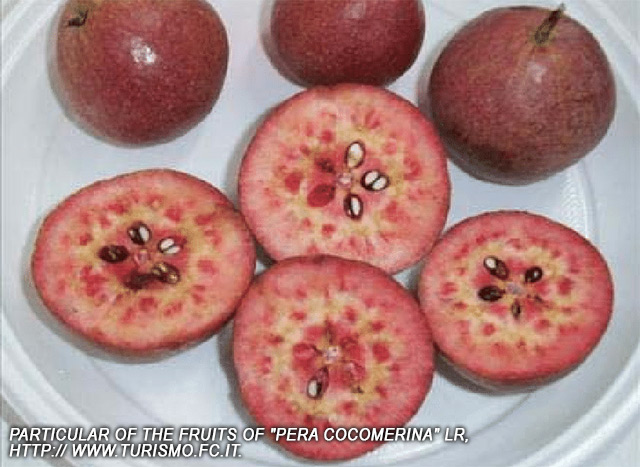
Advertisement
A recent study that explored the nutritional content of cocomerina pears revealed that the fruit is filled with powerful antioxidants that are beneficial to health.
Cocomerina pear is an ancient fruit, a rare variety of the European pear (Pyrus communis) that is currently endemic in the Apennine area of Romagna and Tuscany in Italy. The rarity of the fruit could be attributed to its short postharvest durability, and the pears are produced mainly for family consumption, although they can also be made into jams and liquor.
“These fruits, whose memory is partially or completely lost, are not easy to find, since they are grown only in limited areas, and little is known of their nutritional properties and secondary metabolites content,” researchers wrote in the study published on CyTA – Journal of Food.
With only a limited amount of information about the cocomerina pears, Italian researchers decided to conduct a study to learn more about the health benefits the fruit has. Through this study, they were able to discover that the fruit is rich in polyphenols, flavonoids and anthocyanins.
These components are known to have powerful antioxidant activities that help the body get rid of free radicals. Moreover, previous studies have already shown that anthocyanins, which are responsible for the cocomerina pear’s pink color, can help lower the risk of cardiovascular diseases and inhibit the growth of some cancer cells.
Analyzing the two cultivars of cocomerina pear
The cocomerina pear has two cultivars — one that ripens in August and the other in October. In the study, the researchers compared the polyphenolic, flavonoid and anthocyanin content of both cultivars.
In terms of polyphenols, the late-ripening cultivar had a higher concentration compared to the early cultivar. Also, the polyphenol levels in ripe fruits of the late cultivar were higher than in the unripe one.
When it comes to flavonoids, the team found the highest amount in the unripe fruits of the late cultivar. The flavonoid levels in the ripe fruits of both cultivars, on the other hand, were almost the same.
In addition, the ripe fruits of the early cultivars were observed to have the highest level of flavones and flavonols. But when it came to dihydroflavonol content, the unripe fruits of the late cultivar had a 47 percent higher dihydroflavonol content compared to the unripe fruits of the early cultivar. Meanwhile, the ripe fruits of the October cultivar have a 58 percent higher dihydroflavonol content compared to the August cultivar.
When the anthocyanin levels were assessed, the team discovered that the fruits of the late cultivar had 126 times more anthocyanin compared to the early cultivar. According to the researchers, this could be attributed to the fact that it ripens in the fall where cooler temperatures influence the color of the fruit’s peel and therefore its anthocyanin content. In addition, the research also revealed that the ripening of the fruits at a later period increases the concentration of these important compounds.
Furthermore, the in vitro study showed that the ripe fruits of the late cultivar had higher antioxidant activities. Overall, despite the differences in the amount of antioxidants in both cultivars, the team said that the cocomerina pear extracts’ antioxidant properties of both are comparable or even higher than those in some commercial pear cultivars.
With their findings, the team suggests that cocomerina pears could be used for nutraceutical and functional food applications. In addition, the researchers also suggest that the fruit variety should be conserved and cultivated in the environment.
Sources:
Advertisements







